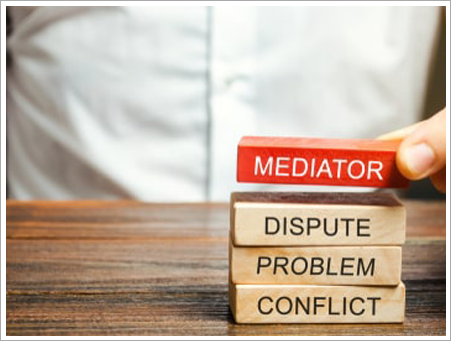How is Arbitration Different from Mediation?
Alternative dispute resolution methods, such as arbitration and mediation, have gained popularity as more efficient and cost-effective alternatives to traditional litigation. Both arbitration and mediation offer different ways of resolving conflict outside the courtroom. While they share similarities, they are fundamentally different. Arbitration involves a neutral third party making a binding or non-binding decision, while mediation focuses on facilitating discussion and negotiation between parties without imposing a binding resolution. Please remember that arbitration can be binding or non-binding, depending on the situation.
If you are interested in pursuing mediation or arbitration for a legal matter in Illinois, contact a lawyer today to better understand what each option has to offer and which option will be best for you.

Further Explaining How Each Arbitration and Mediation Differ
-
Role of a neutral third party – In arbitration, known as an arbitrator or a panel of arbitrators, who act as neutral third parties, are the decision-makers. The arbitrator(s) review the evidence and arguments presented by both parties and render a decision that can be either binding or non-binding. In cases where it is binding, the decision is enforceable in a court of law. On the other hand, in mediation, the neutral third party called the mediator, facilitates communication and negotiation between the parties but does not have the authority to impose a resolution. The mediator helps the parties reach a mutually satisfactory agreement, which is not legally binding.
-
Adversarial vs. collaborative approach – Arbitration follows an adversarial approach, resembling almost a mini-trial. Each party presents its case, and the arbitrator(s) listens to arguments and evidence before making a binding decision. In contrast, mediation takes a collaborative approach. The mediator assists the parties in finding common ground and encourages them to communicate and negotiate directly. The goal is to reach a mutually agreeable resolution that satisfies all parties involved.
-
Level of formality – Arbitration proceedings are generally more formal, resembling a courtroom setting, with formal rules of evidence and procedure. The process often includes written submissions, witness testimonies, and cross-examinations. Meanwhile, mediation is typically less formal. While some structure and guidelines may be followed, the process is more flexible and informal, allowing for open discussions and creative problem-solving.
Contact a Chicago Dispute Resolution Attorney
Understanding these differences between arbitration and mediation is crucial when considering the most appropriate dispute resolution method for a particular situation. For professional help in your legal matter, contact the experienced Cook County dispute resolution lawyers with Teller, Levit & Silvertrust Call 312-922-3030 for a private consultation.
Putting Your
Business First
Business First
To Learn more about our services or schedule an appointment please call 312-922-3030.
To Learn more about our services or schedule an appointment please call 312-922-3030.

